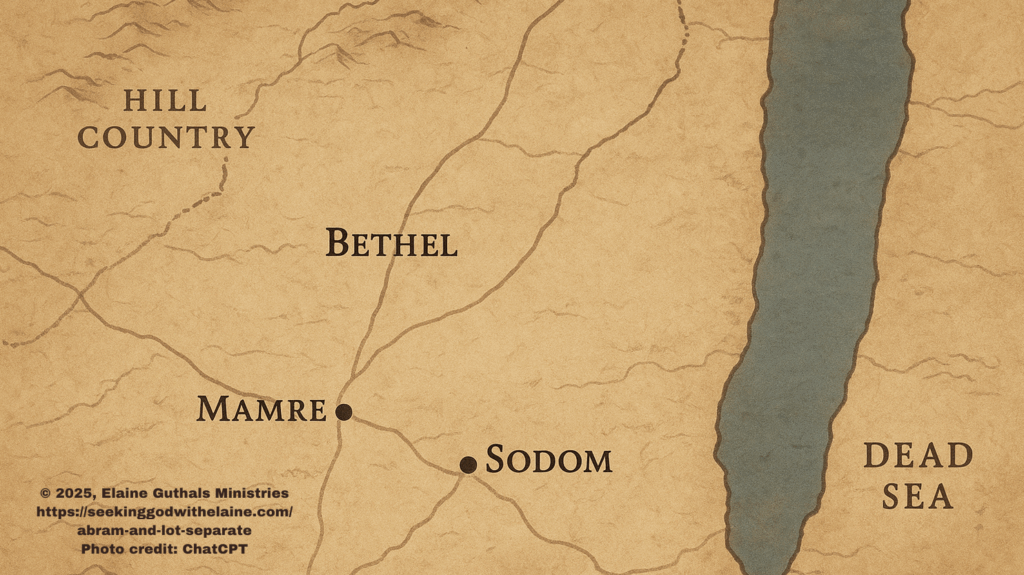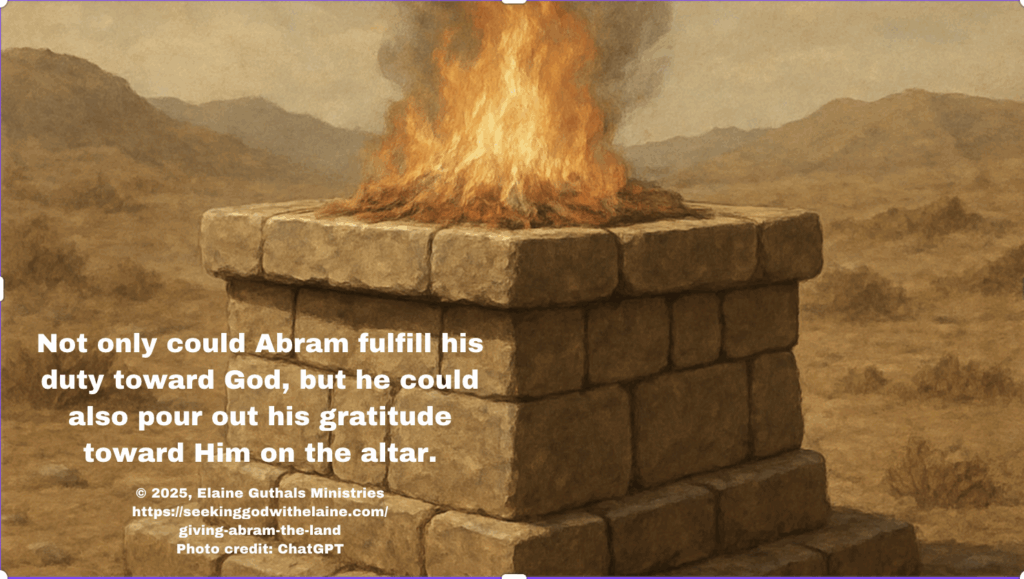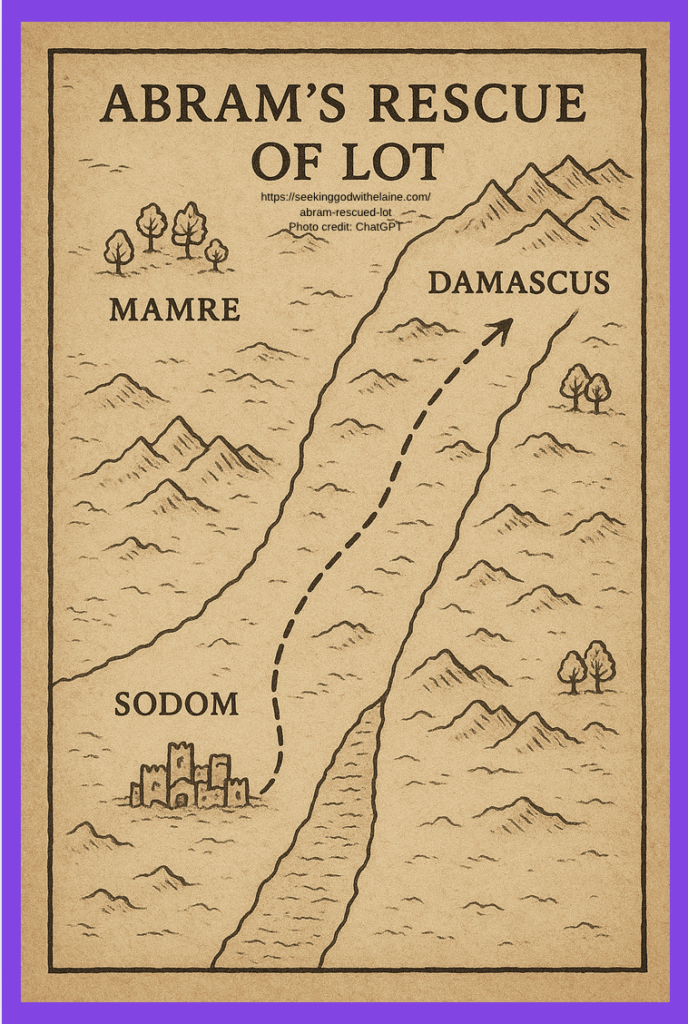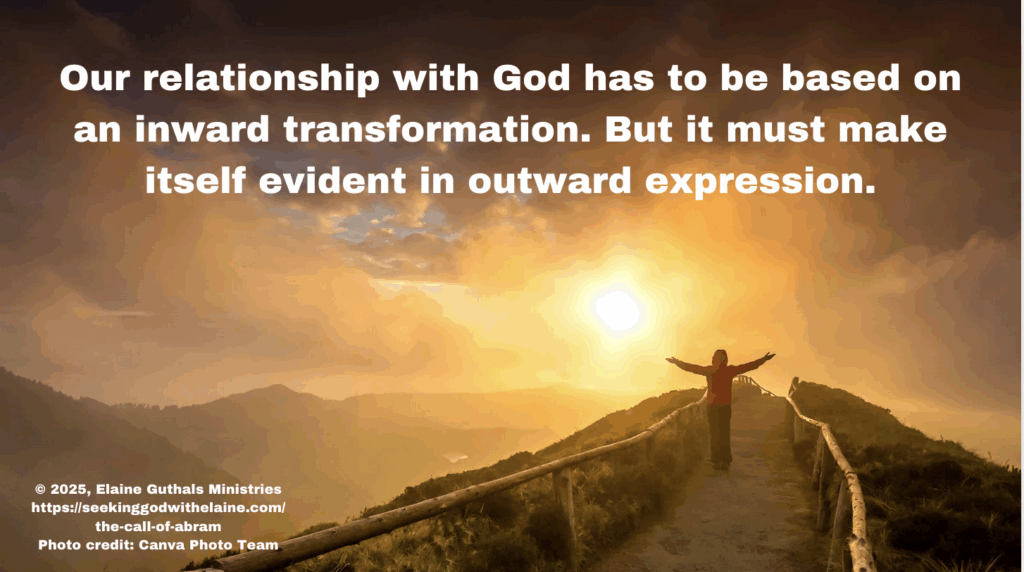
Famine
Canaan was an unpredictable region. It had both fertile land and unpredictable weather.
The unpredictable weather reared its ugly head as a famine. We don’t know how long Abram and Sarai had been in the region, but they were on the move again.
We may question why God sent a famine that would lead to another road trip. It was another testing of his obedience. It was a little more than that, I think.
Abram didn’t feel that he could provide for his family and flocks during the famine where they were at. The famine must have been really bad for Abram to even consider moving.
As obedient as Abram had been, he succumbed to the temptation of sin by not believing God could handle what his new circumstances were.
The onset of these trials doesn’t mean that God has forsaken us. It means He is sanctifying us.
Whether obedient or not, Abram and Sarai headed down to Egypt. If Moses did write this chronologically, the trip to Egypt would have happened somewhere between 1885 and 1880 BC, according to the Old Testament Timeline.
Egypt
There is one tidbit on which this section that is glaringly silent. Did God tell Abram to go to Egypt? Maybe. Maybe not.
Did Abram have any business being in Egypt? Not if God didn’t tell him to go.
Yeah, we may say Abram only lied, but it was more than that. Abram wrecked his witness with the Egyptians.
Abram has only been a disciple for around three years. He is still a milk baby (Heb. 5: 13).
Satan would have really been working on Abram. He would have been throwing doubts and temptations at him right and left.
Abram probably didn’t have any idea what spiritual warfare was. If he did know spiritual warfare was going on, that it was an internal battle may have been outside his understanding.
Truth be known, it is outside of our understanding sometimes.
We bite on Abram because he lied. But he went.
Abram could have stayed – and lost his flocks. But he knew that God was Sovereign God. He knew God could and would take care of him.
So, what happened? Abram didn’t know that lying was a sin? Or was Abram trying to help God out?
We have to stay obedient to God regardless of the circumstances. We need to trust Him through it all.
We don’t see Abram calling on the name of the Lord here. Maybe that was part of the problem.
We aren’t told how long Abram and Sarai stayed in Egypt, but we are given only one chapter of their story there – and it isn’t a flattering one. That may tell us they weren’t supposed to go.
But isn’t that how it goes? One sin leads to another.
Abram left his altar behind. We lose a lot when we don’t consistently meet with God in His house. But we lose even more if we do not have a strong daily devotional time.

Abram thought he would run into trouble in Egypt. He was concerned for his life. He thought the men of Egypt would kill him to take Sarai if he told them he was her husband.
Moses doesn’t tell us how much of a struggle Abram had making this decision. We have no way of knowing if Abram immediately thought God wouldn’t be able to take care of them or if he had to talk himself into it.
Part of us wants to say that we shouldn’t bite too hard on Abram. His fears came to fruition.
But this was an intentional sin.
Abram decided to tell, and Sarai agreed to go along with, a lie. He forfeited truth for safety.
Sarai technically was his sister. But that was a lie and a deception because she was his wife.
Faith opposes false practicality. We can’t conceal the truth because a lie would be easier or more rewarding.
Abram may have told the Pharaoh Sarai was his sister because he didn’t want a confrontation. Abram was a peaceable man with a big heart.
Think of the position Abram put Sarai in. When they took her into the palace, was she just supposed to sit back and let whatever happened to her happen? Was she supposed to commit adultery because her husband sanctioned it? Sarai sure got the raw end of the deal.
But Sarai did agree to go along with the lie and followed through. Maybe she didn’t think she had any choice; but in the end, she chose to go along with the ruse.
God didn’t like how things were going down and stepped in.
We aren’t told how Pharaoh figured out that it was because he was messing with Abram’s wife. Yeah, this may be Moses picking and choosing what to tell of the story. What is important to know is God instigated the tell-all, and Abram’s secret was made known.
The Pharaoh found out that God is all-powerful. Pharaoh may have thought he was, but he was no match for God.
Think about Abram. Yes, he was concerned for his life. Instead, his integrity took a hit. He probably would have used the word dishonored instead of integrity.
What the Egyptians saw was Abram was not, in God’s terms, pure and righteous. They probably would have just said he was a liar and untrustworthy.
The Egyptians’ response were quick to point out that Abram caused the problem by not telling them Sarai was his wife. And they would be right. But that lie did not force them to take Sarai into the palace. That was their choice alone.
The Egyptians were done with Abram. In fact, he and his family were being escorted out of the country of Egypt.


If Moses was writing this record right before the Israelites made the exodus from Egypt, wouldn’t that have given the Israelites a boost before the start of their journey?
Abram saw Egypt. Jacob saw it. Joseph saw it. Jesus saw it.
Abram was heading home after a failure. Not just heading home, but Abram was heading home forgiven and favored.
Abram couldn’t have lived in Canaan more than a couple of years before he headed for Egypt. Was he returning because of his love for the land? Was Abram going back just because it was promised to him?
I don’t think God was upset that Abram was heading there “… by stages …” (Gen. 13: 3 NLT). Our sanctification happens in stages. Through his camel steps, Abram was showing Sarai, Lot, and anyone in the caravan what true repentance was.
Abram turned away from his lie and deception and went back to God. He was in a better place spiritually.
God made Abraham prosper. No, that didn’t make it a prosperity gospel. It made it an obedience gospel.
When we sin, God calls us back to where we were with Him.
Abram knew a response that God wanted was worship. He was constantly building altars. He was heading back to the altar he built at Bethel. Abram was heading back to God.

Lot
Terah’s either youngest or possibly middle son Haran, though his wife was not listed, had a son named Lot. Unfortunately, Haran died before the family left Ur.
Lot didn’t find his way back to God because he hadn’t been with God previously. When we’ve talked about the altars that Abram built, Lot wasn’t mentioned.
Really, we have just heard Lot’s name mentioned a couple of times in conjunction with the trip to Canaan.
Moses didn’t give us any clue as to how old Lot was. At first glance, we may say Terah had been raising Lot after Haran died. But Moses said Terah took Abram and Sarai, who were 70 and 60 respectively, in the same breath as he said Terah took Lot.
We know Lot had two daughters who were betrothed. They had fiancés but not husbands yet. That may put them around 13.
It is easy to think that these two girls are Lot and Mrs. Lot’s only children. However, I don’t see the angels asking about other sons and daughters if they knew he didn’t have any. If they didn’t know beforehand, I am sure God would have given them a manifest when He gave them this assignment. “Go get these specific people out.”
Wait a second. Doesn’t that mean Mrs. Lot had to come from Ur with them???? So, why isn’t Mrs. Lot on the manifest? She does play a very brief but significant role in the future.
Lot had become a wealthy man in his own right. His problem, as we will see, is that he was self-seeking.
Maybe Lot had started out from Ur following God’s call. Like salvation, our initial acceptance of God at conversion is only the beginning. We must then walk with God daily as we are sanctified.
The wealth and opulence of Egypt may have had an impact on Lot. Being dazzled by the country may have turned him away from God if he had called upon God previously.
Regardless of Lot’s relationship with Abram and God, the herdsmen were fighting. True, the herdsmen could be seen as doing their jobs — providing for and protecting their herd. They were surely frustrated that there was not enough resources for both. Neither Abram nor Lot owned the land. The Canaanites and Perizzites did.
We may judge Lot here, but by the time he left Sodom, he was a righteous man. He was sick of the culture in which he lived. Abram’s nephew, though he ends up a righteous man, is an ineffective disciple.
It sounds like Lot started good, got lost it in the middle, but came back to God before the end.
Lot didn’t go directly to Sodom. He didn’t instantaneously choose evil. He inched toward it.
Doing for ourselves brings us way worse results than doing it God’s way. He chooses who He will bless and what gifts they will receive.

Abram and Lot
Abram and Lot both being wealthy caused problems.
Their herdsmen were quarreling. Lot and Abram were probably being drawn in by degrees. However far it had progressed, the dispute doesn’t seem to have alienated Abram and Lot.
Abram didn’t want to conflict to escalate to include him and Lot. They did come to a solution between themselves.
What Abraham didn’t have to do was give Lot the first choice on the land. He was the elder, not Lot. Not only that, he also was now the head of the family. He probably had the bigger herd than Lot.
Abram may have believed that God would bless him either way he went. So, he let Lot choose because, to him, it didn’t matter.
Abram showed us that pulling rank is not always the answer. Neither is always being right.
So, Abram’s gentle, generous answer was, “Lot, you mean more to me than having the best land. I want to see you settled, happy, and thriving. Where do you want to live?”
Abram showed us that God meant all to him. God meant more to him than his worldly interests.
Abram imitated the graciousness of God. What Abram was doing was extending to Lot the type of grace that God extended to him.
It is easy to say that, regardless of where Abram ended up, God would bless him. And maybe Lot thought that in part, too.
And yes, God will bless us in not-so-good circumstances when we are being obedient to Him. It wasn’t — and shouldn’t be — a test for Him to do that.
Lot chose wrong. Genesis 13 was a defining moment in Lot’s life. His choice here set in motion the rest of his story.
Many of us wonder how Lot could have been so insensitive to his Uncle Abram. Abram was being generous while Lot was being selfish.
It is easy for us to say that Lot chose to live among the idolators. But there were isolators all around Abram.
Lot wanted to see a path that led to material wealth. He wanted to be able to make his own decisions without censure from anyone — human or divine.
Our choices may seem inconsequential at the time. They do lead to the next decision — if not in relation to it, at least in mindset used to make the decision.
Lot went south, and Abram was in the north at Bethel.
Many would say that Abram got the short end of the stick. I’ve always thought that the land that Lot left for Abram was more desert. Abram would obviously have a harder time making a living on the land that Lot left for him.
Lot chose the fertile ground compared to the Garden of Eden to live among the idolators – and lost everything.
Abram took what was left – regardless of how good or bad the land was – went with God and gained everything.

Abram made his home in Mamre in Hebron.
Mamre was a small village 22 Roman miles (a shade over 20 miles) from Jerusalem. It was where Isaac was born and where, later, Abraham, Sarah, Isaac, Rebekka, Jacob, and Leah were buried.
God gave Abram the promise of the land. The only land Abram owned was the cave in which he buried Sarah (Gen. 23: 17-20) – and where he, Isaac, Rebekka, Jacob, and Leah were buried.

Abram walked with God in faith and obedience. Sure, he still sinned.



Rescue
Kedorlaomer (Cherdorlaomer) was King of Elam, a descendant of Shem. The Cities of the Plains had been under the rule of Kedorlaomer (Cherdorlaomer), King of Elam for 12 years.
A close ally would have been the king of Goiim or Goyim. That is the word used for Gentiles. Japheth, Seth’s brother, was the forefather of the Gentiles.
In the 13th year, five kings, most descendants of Canaan, rebelled against Kedorlaomer.
Lot wanted wealth and possessions, but here he was a captive stripped of his possessions
Uncle Abram went to the rescue.
It is interesting that Moses listed three allies. It is nice to know Abram had allies in the area.

Lot may have been out of sight, but he was not out of Abram’s mind and heart.
Abram and Lot had parted ways because of a conflict. We think they parted on decent terms, but there may have been some residual resentment.
That didn’t stop Abram. He didn’t let past history affect his desire to rescue Lot. He and his 318 fighting men took off to rescue Lot.
Abram didn’t need the numbers. He had God fighting with Him and for Him.
Kedorlaomer was the ruling power in those parts at the time. Abram as a private citizen had no right to wage war against a king.
Up to this point, we haven’t seen Abram as a warrior. We’ve seen him as a worshiper. But in that era, Abram had to have been at least a fighter.
Walking with God does not mean Abram was turned into a doormat. He wasn’t a conscientious objector.
Abram did become a general in this instance. The New Living Translation sugarcoats the battle. It says victory. The Complete Jewish Bible says slaughter. He knew enough about fighting to see the benefit of a nighttime offensive.
This tells me that, even though it sounds like they picked up and went after Lot without much notice, they were ready. They already had the training. They may have had a generic contingency plan for being attacked, defending themselves, etc.
Abram and his soldiers were ready.


But I wonder if Abram knew they were family. That is a kicker, isn’t it? Abram was going to save family from family.

Celebration
Abram met with two diverse kings after returning. The King of Sodom was a worldview king.
The King of Sodom came to Abram, not the other way around. Sounds like Abram thought this was just a duty call. It doesn’t sound like Abram gave the King of Sodom any great reverence.
Abram did give reverence to Melchizedek because he was a High Priest and King. Yeah, probably ungodly verses godly had something to do with it.
Abram took a minute to worship God with Melchizedek.
Also, for the first time, we learn about tithing. Abram gave Melchizedek a tenth of the spoils.
Some say Melchizedek was Shem. Some say he was Jesus. I just have problems with Jesus being in human form before it was time to be Messiah. Did He come down and not sin? Or did He sin as Melchizedek? Even if He was Melchizedek – if He sinned – wouldn’t that disqualify Jesus as Messiah?
The job of the priest is to bless others. Melchizedek performed this task.
Melchizedek also knew that Abram was a blessing to God. We are to bless God with our faith, obedience, and worship.
Abram’s disinterestedness and independence led to him not taking any of the recovered goods.
Abram accomplished his goal of rescuing Lot. He didn’t care about the rest. It wasn’t his before. He had no desire for it after he gave the 10 percent to God.
Abram certainly didn’t want to gain from people who had lost because of war. But then was it the King of Sodom’s stuff get give away anyway?
Elam, Babylonia, Ellasar, and Goiim invaded Sodom, Gomorrah, Adman, Zeboiim, and Zoar. Abram defeated Elam, Babylonia, Ellasar, and Goiim. Abram then owned Canaan.
Abram didn’t take the country. Wouldn’t that have legitimized the promise God gave Abram?
But then the land wouldn’t be a gift from God. It would have been something Abram earned. It would have been from man – specifically the Sodomites.
Some may say that Abram should have taken it. Maybe then Sodom and Gomorrah wouldn’t have been destroyed (Gen. 19).
If Abram would have demanded the land, then the covenant would have been broken.



To read devotions in the Creating Everything theme, click the button below.
Devotions in the Abraham the Emigrant series